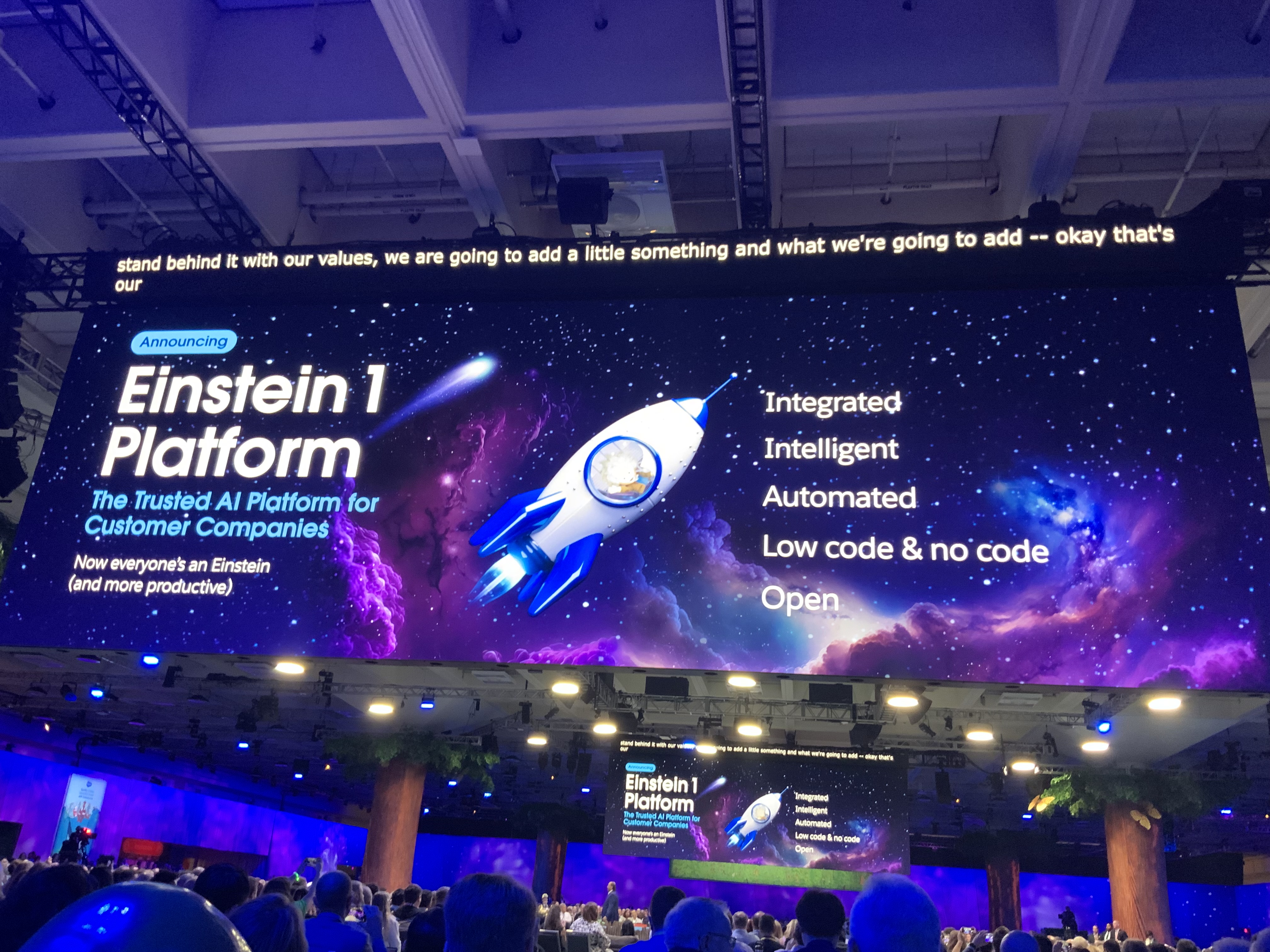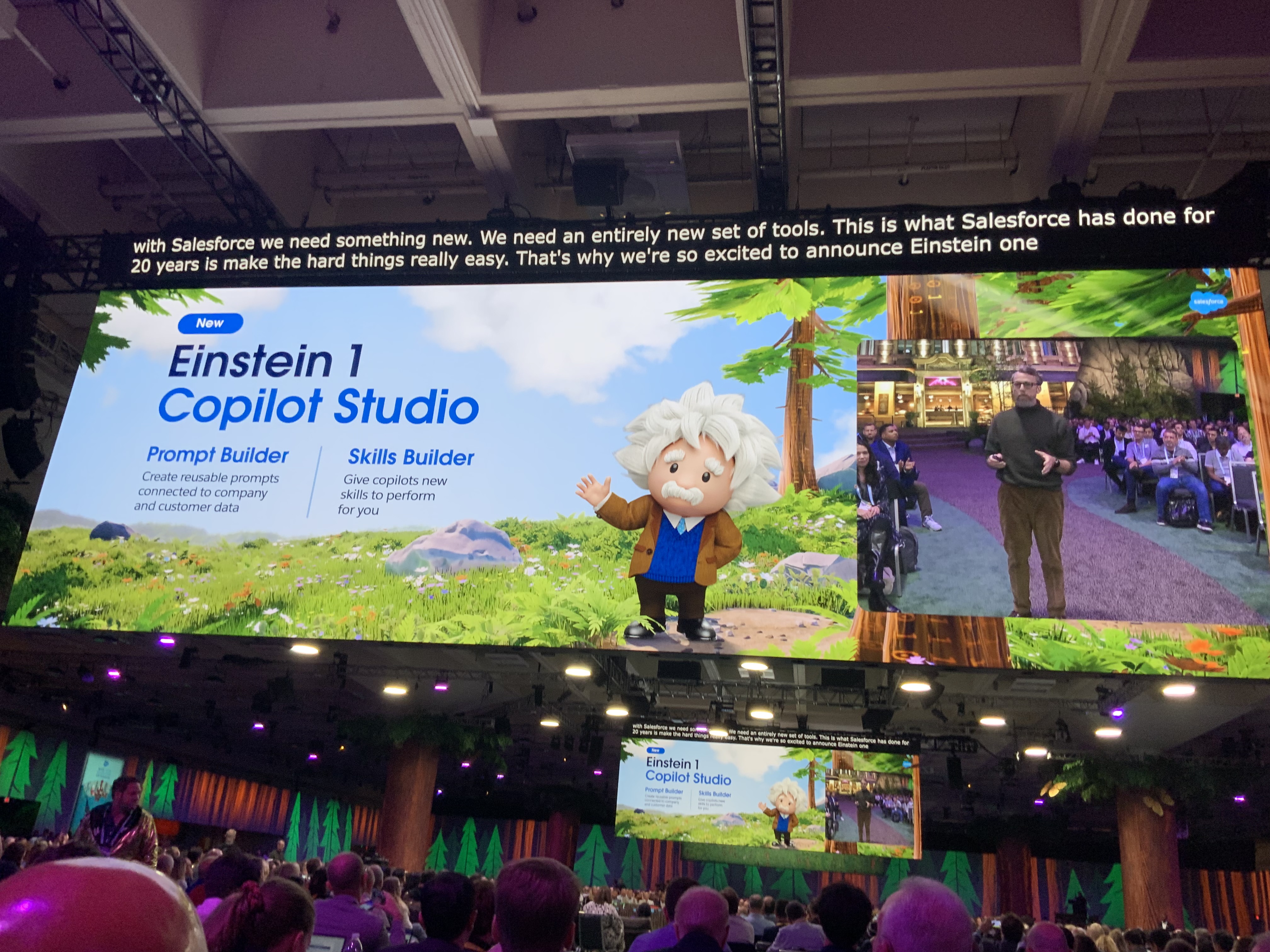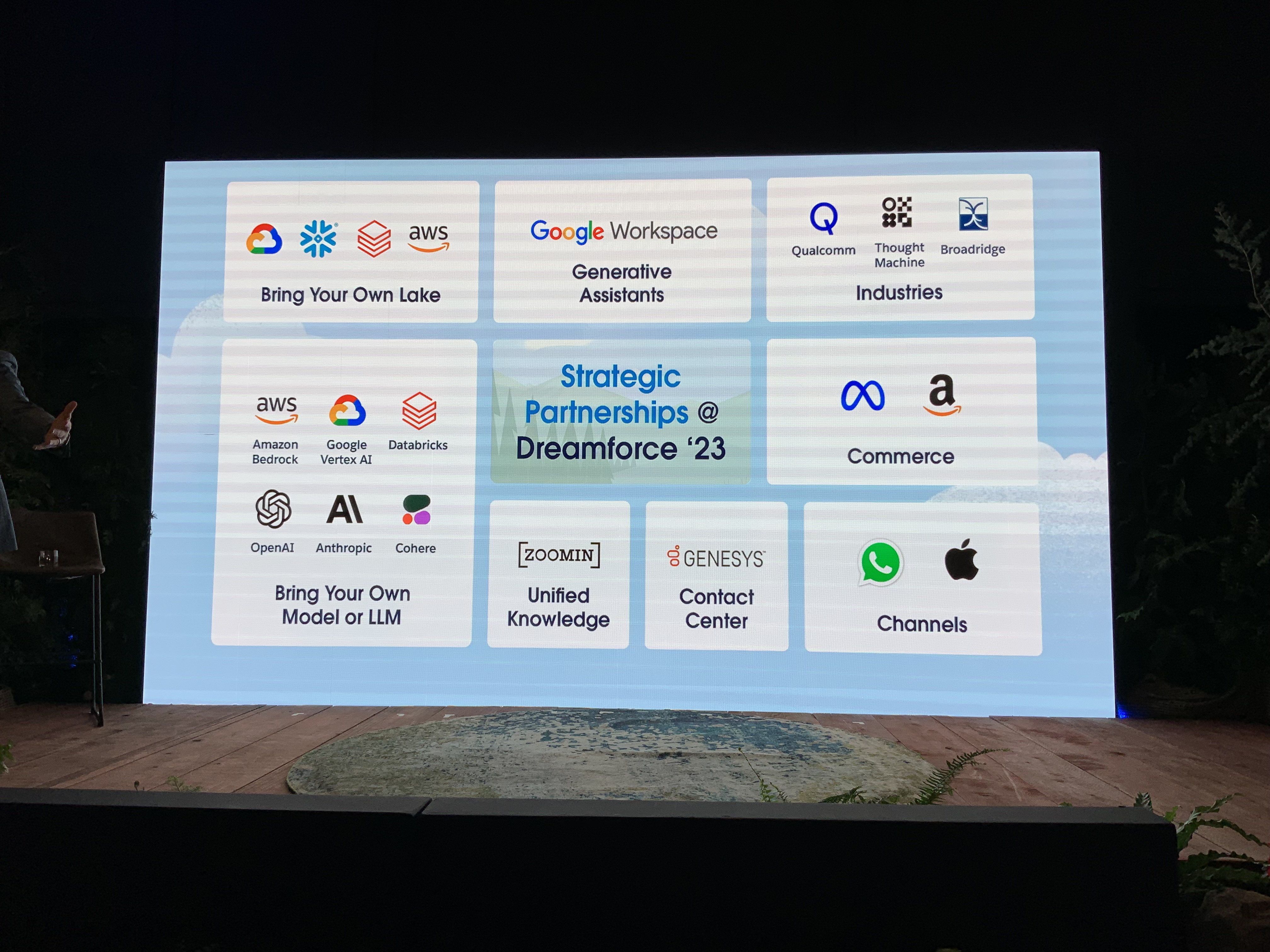Under the glimmering lights of Dreamforce 2023 in San Francisco last week, the atmosphere was palpable with anticipation as the SaaS leader, now the #3 software company in the world according to estimates, made its most strategic AI announcement yet. Industry leaders, tech enthusiasts, IT practitioners, and Salesforce's core CRM audience all gathered together at Moscone Center to witness the unveiling of Salesforce's latest AI advancements, keenly aware of the seismic shift that AI integration will bring to their organizations and IT departments.
The stakes at Dreamforce were high this year, with the need to deliver on the promises of major gains that AI can provide in terms of business/IT efficiency as well as highly automated -- or at least significantly AI-augmented -- customer-centric operations. IT attendees were focusing on the implications of integrating Salesforce's powerful new AI capabilities into their existing product portfolios, enterprise architectures, and operating models. While the announcements themselves have already been covered by Constellation Insights, I instead seek to understand how these these developments will change the way businesses operate. More critically, how would IT departments and early generative AI adopters need to assess and eventually integrate with Salesforce's most serious foray yet into artificial intelligence?
Photo: Salesforce's main AI announcements at Dreamforce 2023 centered around the new Einstein 1 Platform
The AI Announcements at Dreamforce 2023
- Einstein 1 Platform: A new unified platform for AI development and deployment, built on the Salesforce Customer 360 platform. It fully supports generative AI and can use many of the most common large language models.
- Salesforce Data Cloud. This is the company's hyperscale data platform that enables businesses to connect, harmonize, and activate a wide range of their customer data across Salesforce applications. It is also the foundation of the Customer 360 platform. Most significant was the messaging about "bring your own lake" and "bring your own LLM or model.". The AI in the Einstein 1 Platform primarily operates on the information in Data Cloud.
- Einstein Trust Layer. This is a new security architecture built natively into the Einstein 1 Platform. It is designed to help businesses adopt and use AI responsibly and securely, while preserving their customer data privacy and security standards. It assrures secure data retrieval of data for AI use, a grounding capability to ensure factual answers, data masking, audit trails, zero data retention if needed, and something known as "toxicity detection", which is sure to generate questions as to bias, yet is also an important move towards ensuring AI is business-ready.
- Copilot and Copilot Studio: A set of AI work accelerators for Salesforce's various cloud products (sales, marketing, and service), plus a matching low-code/no-code AI development tool that enables anyone to create and deploy their own AI copilots, even without coding experience.
- Free Tier for Data Cloud and Tableau: Salesforce announced that it will be offering free Data Cloud and Tableau licenses to all customers, making it easier for businesses of all sizes to access and manage their data. This will make AI adoption easier and less expensive in the beginning for some customers.
- Data Cloud-Driven Flow: A new feature that allows businesses to automate workflows based on data from the Data Cloud.
Photo: Einstein Copilot Studio enables anyone to AI-enable tasks through prompt and skill builders
Implications for IT Departments and AI Adopters
The unbelievably rapid proliferation of AI technologies is currently making waves across the IT landscape. For IT departments and AI adopters, the current era is not just about embracing AI head-on. Instead, it's also about 1) detangling the intricate web of various fast-evolving AI platforms and 2) sorting out AI features added to existing products already being used, along with potent new foundational models and LLMs, all while selecting a refined shortlist of top-tier AI solutions that will somehow work well together.
This challenge is further amplified by findings from a recent Constellation Research survey I conducted, wherein nearly a quarter of CIOs and CDOs admitted to putting a halt on ad hoc generative AI apps and features. Their concerns mainly revolve around the obscurity of data flow and the processes through which these products assimilate and share corporate knowledge. Given the long-term implications, organizations have to act swiftly to prepare for AI, with top activities including understanding AI's competitive impact, the leading areas in the business to deploy AI, defining ethical AI policies, ensuring AI is safe to use, protecting data integrity, and training their workforce to work with AI tools. Salesforce, with the positioning and feature set of its Einstein 1 Platform, is indeed staking its claim in offering a formidable top-level enterprise AI capability. However, integrating such a robust tool further requires businesses to properly strategize on making it work coherently, cost-effectively, and beneficially with their existing systems and processes.
With these concerns, there are the top implications for the Einstein 1 Platform, with eye towards the needs of IT departments and generative AI adopters
1.Managing Multiple Enterprise LLMs: How will enterprise stack their various LLMs together? This was increasingly the question of the day at Dreamforce 2023, with domain-specific LLMs (medical, coding, etc.) as well as with external plus internal enterprise LLMs. With the integration of AI tools, IT departments will need to ensure simultaneous cross-model usability and coherence between multiple foundation models. The AI’s constant learning and evolving processes can lead to potential conflicts or redundancies if not managed correctly. In a high priority focus area that demands clarity, it's still not clear yet a) how well Einstein 1 Platform fully enables stacking, b) how strongly their new specially-tuned XGen-7B large language model will feature in the plaform, and c) how enterprises will make all of these modesl co-exist effectiely as organizations sort out their LLM mixes.
2. How Does the Safety Layer in the Einstein 1 Platform Fit into an Enteprise AI Landscape? The introduction of AI necessitates robust safety and security layers. As AI learns and evolves, the system must prevent it from making decisions that could harm the enterprise or its customers. It must protect data/IP while producing useful, accurate output. It means IT departments will need to have stringent safety protocols in place and conduct regular audits. But most importantly, IT orgs and Ai adopters must determine if Salesforce's ambitous and heavily-touted safety layer can serve as the root-level safety layer or just part of a trust regime.
3. Data Management and Privacy: With the Einstein 1 Platform collecting vast amounts of data for better insights, managing this data becomes paramount. It raises questions about data storage, retrieval, and most importantly, privacy. IT departments will need to ensure data residency, PII protection, GDPR compliance and other regional data protection regulations. Understanding how Data Cloud supports these needs and plays well with other data platforms will be key. For its part, Salesforce seems committed, rightly, to openness and interoperability, yet keeping strict control and oversight over corporate data with its trust layer.
4. Intellectual Property Protection and Ownership: As AI systems generate new content, such as marketing drafts or product ideas, the lines around intellectual property rights can blur. Enterprises will need to set clear terms about IP ownership. Salesforce as very clear they have data retention and control policies, and that they aren't gong to make a business from your data. But we're barely in the first inning of generative AI and issues like who own the output, who has legal liability if an AI platform provides plagiarized or otherwise unauthorized content and so on. Microsoft recently offered indemnities for legal liability on AI copyright claims and its not clear if Salesforce will follow suit. These are compelling subjects given the growing involvement in generative AI projects within the enterprise by legal and compliance teams.
5. Impact on Workers With Einstein Copilot. Copilots are fast-arriving and other similar AI-driven assistants are becoming commonplace. The workforce will soon undergo a significant shift as most rote work is eliminated. Workers will need training to work alongside AI, and IT departments will have to ensure that these copilots function as aids rather than replacements. But work itself is going to change as AI assists a growing percentage of work. Getting results from AI depends on broad deployment tof copilots, but this also has many downstream ramifications that organizations should get ahead of now. Einstein 1 Copilot Studio is going to be a major force for unleashing productivity across many business functions, but also will also likely creatte significant worker redundancy for certain classes of tasks.
6. Strategic Integration: Enterprises will need to have a clear strategy for integrating the Einstein 1 Platform and its associated features into their AI portfolios and ModelOps regimes. It means aligning business objectives with AI capabilities, ensuring that the technology serves the company's broader goals. But it also means ensuring the data foundation, trust layers, and enteprise-wide AI operations are all connected and operating holistically. It's not clear yet how well Einstein 1 Platform integrates at each level, but at least this analyst believes that the commitment is there from Salesforce to make it happen if there are shortfalls.
7. Operational Redundancies: The integration of AI could lead to operational redundancies, especially in areas like customer service or data management. Enterprises will need to identify these early and potentially retrain or redistribute workforce resources. In 2024, IT orgs and AI adoption teams must identify how the mix in staffing profiles will change -- sometimes significantly -- in 2024 across the business and IT.
8. Ethical Considerations and Guardrails: The profound capabilities of AI systems like Einstein bring forth ethical questions. How much autonomy should these systems have? Where is the line drawn for data collection and customer privacy? Enterprises will need to address these concerns head-on, establishing clear ethical guidelines and actionable policies for AI adoption and usage. It will become increasingly easy -- as anyone can build copilots or use generative AI in the work processes -- to tap into customer data for uses that may not seem questionable at first glance, but that proper oversight would show is not an allowable use. Guardrails -- almost certainly automated -- will need to prevent inappropriate usage of AI at scale and may well be one of the major issues that ultimates slows down broad deployment for a while until working to a high degree of capability. Salesforce's trust/safety layer appears to be robust enough to grow this capability, but does not appear to have it in full-fledged form today.
Photo: Salesforce's Openness to 3rd Party Data Lakes and AI Models is Significant and Important
Utimatley, while Salesforce's announcements at Dreamforce 2023 showcased the vast potential of AI in transforming business operations, they also underscored the myriad considerations for IT departments. As AI continues its inexorable rise, IT departments and AI adoption teams stand at the forefront, guiding their enterprises through uncharted territories, ensuring that the promises of today translate into the competitive differentiators and historic opportunities of tomorrow. Salesforce's announcements at Dreamforce 2023 keep the company squarely in the AI race, but also raise a number of important issues that must be addressed. Because not adopting AI until all the issues are addressed is simply not an option for most organizations today, who badly need to gain experience and maturity in generative AI right now, to gain access to their futures.
My Related Research
How to Embark on the Transformation of Work with Artificial Intelligence
Analysis: Microsoft's AI and Copilot Announcements for the Digital Workplace
How Visual Collaboration Vendors are Adding Artificial Intelligence to their Platforms
How Generative AI Has Supercharged the Future of Work
Analysis of the White House's Guidance on Responsible AI Research, Development, and Deployment
How Leading Digital Workplace Vendors Are Enabling Hybrid Work
Every Worker is a Digital Artisan of Their Career Now
How to Think About and Prepare for Hybrid Work
Why Community Belongs at the Center of Today’s Remote Work Strategies
Reimagining the Post-Pandemic Employee Experience
It’s Time to Think About the Post-2023 Employee Experience
Research Report: Building a Next-Generation Employee Experience
Revisiting How to Cultivate Connected Organizations in an Age of Coronavirus
How Work Will Evolve in a Digital Post-Pandemic Society
Creating the Modern Digital Workplace and Employee Experience
The Challenging State of Employee Experience and Digital Workplace Today
The Most Vital Hybrid Work Management Skill: Network Leadership





